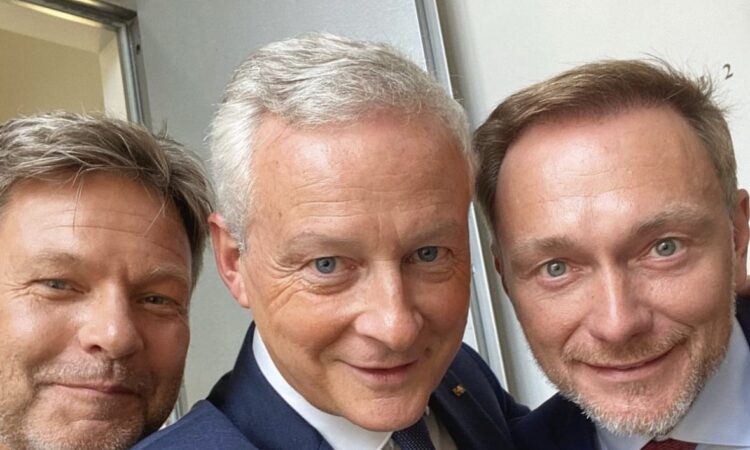
In a display of unity amid mounting challenges to Europe’s role in the global economy, ministers from France and Germany have resolutely backed efforts by the European Union to investigate unfair competition allegations against China for electric vehicle production. Both sides stressed their determination to generally strengthen the two countries’ cooperation on industrial transformation: “Europe has to make sure its interests are being safeguarded,” German economy minister Robert Habeck said at a press conference in Berlin together with his French counterpart, Bruno Le Maire. The joint statement followed an announcement from the EU Commission president Ursula von der Leyen to start a probe into possible distortion of competition by the Chinese government through illicit subsidies for its booming electric vehicle industry.
A key EU policy aim is the transition to a low carbon economy, with France and Germany being among the greatest advocates for such a push. Both countries are hoping to reinvigorate national industries in the process. They have sought close cooperation to streamline efforts to obtain access to relevant EU support programmes, despite differences over key aspects of the energy transition, particularly regarding nuclear power. However, Paris and Berlin also share many industrial interests and have promised to intensify cooperation in light of the recent energy crisis and increasing protectionist tendencies in international trade.
Habeck said the “many subsidies” available in the EU should be better focused on supporting industrial transformation. Reducing regulation and speeding up procedures and licensing are among the steps both ministers said their countries will better coordinate in the future and integrate into wider EU efforts of the Net Zero Industry Act. “It’s not only about expanding renewables faster, but also expanding those industries that make those renewables faster,” Habeck said.
Speaking in German, Le Maire called the regular meetings between French and German ministers “a useful tradition” that underpins the “close and efficient cooperation of France and Germany in matters of climate action, competitiveness, energy, innovation or growth.” Faced with competition from China and a fast-recovering US economy, Europe must close its ranks to defend its position on global markets, Le Maire argued. “We cannot be satisfied with investments in innovation that are inferior to those in China or the US,” he added. Ensuring access to low-carbon energy “at attractive prices” for all member states is a topic that will preoccupy the EU for some time, the French minister said. This would be one of the conditions to enable “an equal game” with other major economic powers, he added. “I’m sure that we will be able to come to a common understanding with Germany about the energy issue and a reform of Europe’s energy market.”
EU “must defend economic and industrial interests” and “think big” about joint projects
Historically differing positions between the two countries’ energy systems should not stand in the way of a joint push, Le Maire stressed. The French minister explicitly backed an EU probe into possible violations of international trade laws, arguing that France continued to be open to cooperate with China on the basis of “fair competition.” While not mirroring his French colleague’s eagerness to open proceedings against China’s business practices, German minister Habeck agreed that an investigation is needed. “Not doing anything is not possible,” he said. The ministers’ joint statement comes after months of difficult negotiations between France and Germany regarding the EU’s strategy to achieve carbon neutrality by mid-century. The energy crisis revealed cracks in the countries’ energy policies that need to be overcome in order to improve the bloc’s chances of staying on course to meet its climate targets while protecting its economic prowess.






